13 Best Herbal Tinctures For Pimples
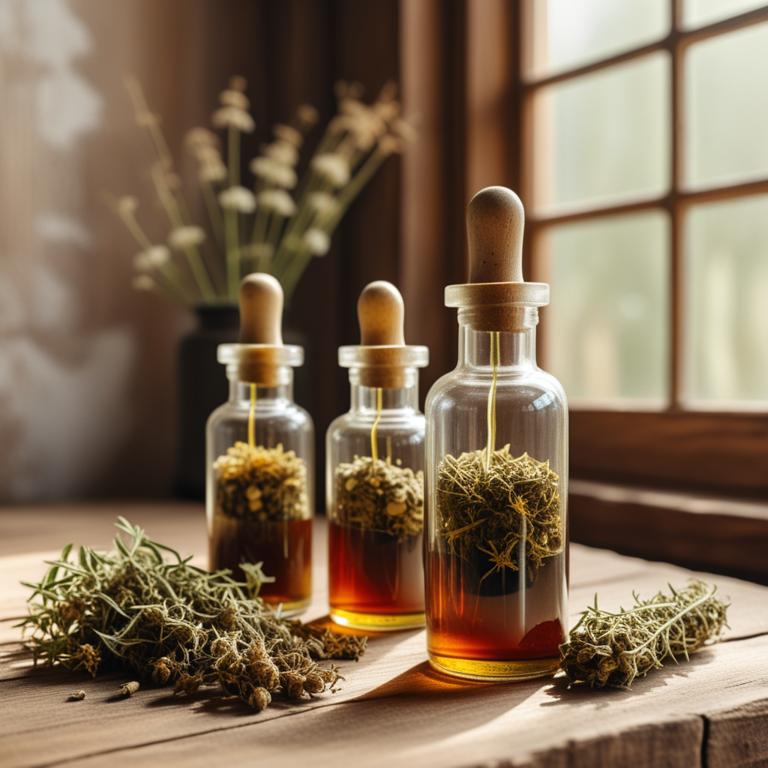
Herbal tinctures for pimples are liquid extracts made from various herbs and plants that are used to treat acne and other skin issues.
These natural remedies offer several benefits, including reducing inflammation, preventing bacterial growth, and promoting healthy skin.
Examples of herbal tinctures that can be used to treat pimples include tea tree oil, which has antibacterial properties that help combat acne-causing bacteria; aloe vera, which soothes and calms the skin; chamomile, which reduces inflammation and promotes relaxation; lavender, which has antiseptic and anti-inflammatory properties; neem, which has antibacterial and antifungal properties; and calendula, which promotes wound healing and skin regeneration.
By incorporating these herbal tinctures into your skincare routine, you can reduce the occurrence and severity of pimples while promoting healthy, glowing skin.
According to "American journal of clinical dermatology", tinctures for pimples may be effective in treating acne, particularly those containing Mahonia, tea tree oil, and Saccharomyces, which have shown potential as standard treatments.
Below there's a list of the 13 best herbal tinctures for pimples.
- 1. Silybum marianum tinctures
- 2. Salvia officinalis tinctures
- 3. Urtica dioica tinctures
- 4. Aloe vera tinctures
- 5. Hypericum perforatum tinctures
- 6. Zingiber officinale tinctures
- 7. Calendula officinalis tinctures
- 8. Melissa officinalis tinctures
- 9. Rosmarinus officinalis tinctures
- 10. Lavandula angustifolia tinctures
- 11. Echinacea purpurea tinctures
- 12. Cinchona officinalis tinctures
- 13. Glycyrrhiza glabra tinctures
Also you may be interested in...
TODAY'S FREE BOUNDLE
Herb Drying Checklist + Herbal Tea Shopping List + Medicinal Herbs Flashcards
Enter you best email address below to receive this bundle (3 product valued $19.95) for FREE + exclusive access to The Aphotecary Letter.
$19.95 -> $0.00
1. Silybum marianum tinctures
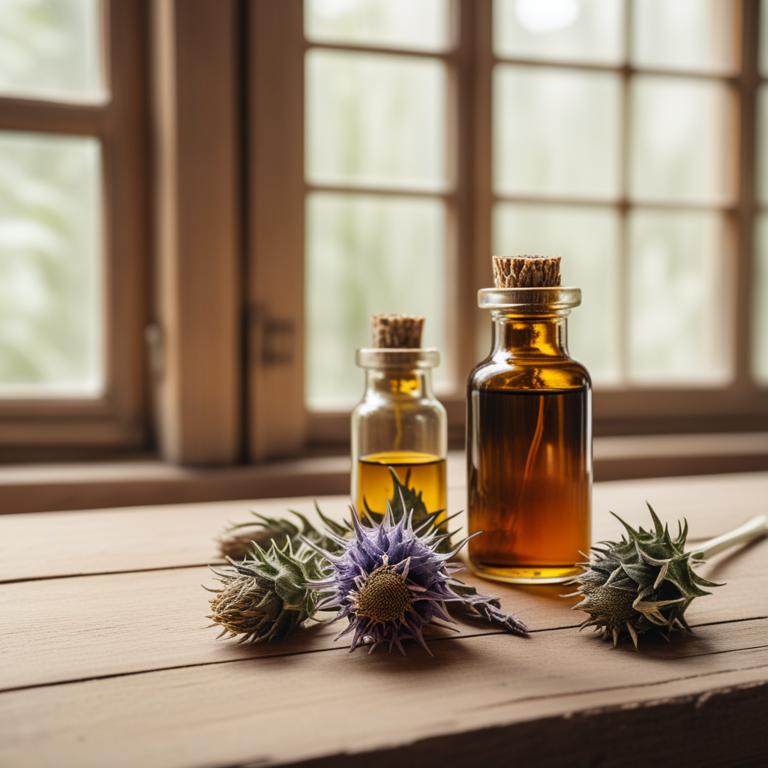
Silybum marianum tinctures, derived from the milk thistle plant, have been traditionally used to treat various health conditions, including pimples.
The properties of Silybum marianum tinctures that help to treat pimples include its anti-inflammatory and antioxidant properties, which help to reduce redness and inflammation associated with pimples.
The bioactive constituents of Silybum marianum tinctures, such as silymarin, flavonoids, and phenolic acids, help to treat pimples by regulating the body's inflammatory response and protecting the skin from damage caused by free radicals.
The benefits of using Silybum marianum tinctures to treat pimples include reduced severity and duration of pimples, improved skin health, and reduced risk of scarring.
Related Study
According to "Dermatologic therapy", Silybum marianum tinctures for pimples may be effective due to Oregon grape root's synergistic antibacterial, anti-inflammatory, and bile-stimulating properties.
2. Salvia officinalis tinctures
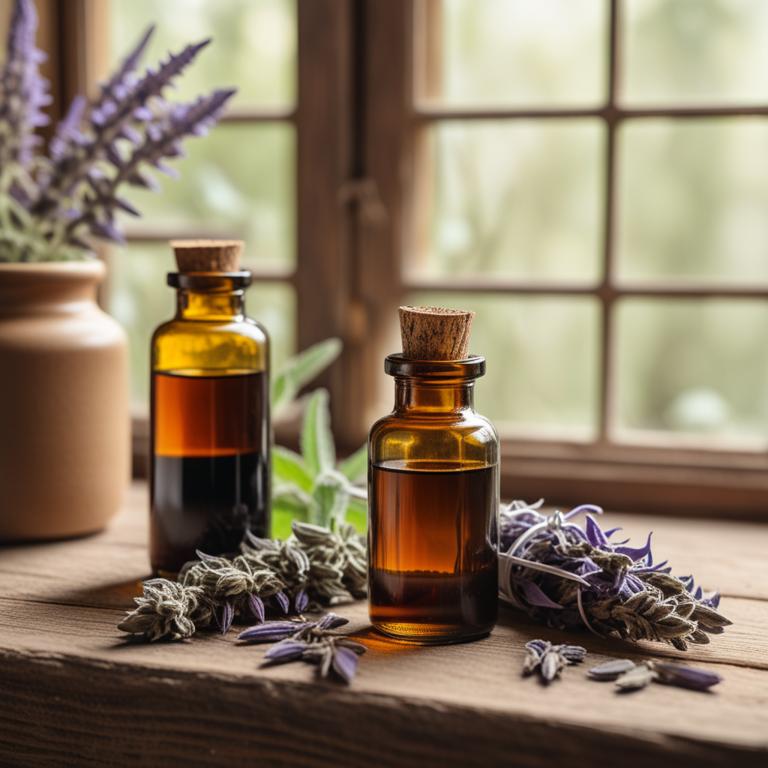
Salvia officinalis tinctures have been traditionally used to treat pimples due to their anti-inflammatory and antimicrobial properties, which help to reduce redness and prevent the spread of infection.
The tannins and flavonoids present in Salvia officinalis tinctures possess astringent and antiseptic properties, which contribute to the reduction of acne severity and promote skin healing.
The bioactive constituents, including rosmarinic acid and ursolic acid, exhibit potent antioxidant and anti-inflammatory activities, which help to soothe irritated skin and reduce inflammation associated with pimples.
By using Salvia officinalis tinctures, individuals can benefit from their ability to balance skin pH, reduce sebum production, and promote overall skin health, making them a potentially effective natural remedy for pimples.
3. Urtica dioica tinctures
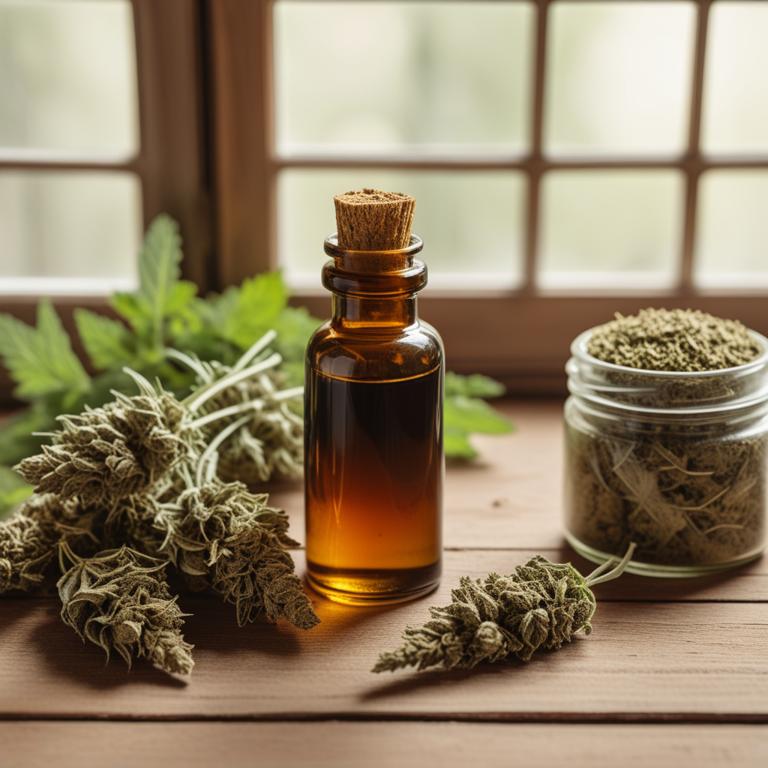
Urtica dioica tinctures, derived from the leaves of the stinging nettle plant, have been traditionally used to treat pimples and acne due to their anti-inflammatory and antibacterial properties.
The tannins, flavonoids, and phenolic acids present in Urtica dioica tinctures help to reduce inflammation, prevent bacterial growth, and promote wound healing, thereby treating pimples effectively.
The bioactive constituents of Urtica dioica tinctures, such as apigenin and quercetin, exhibit potent antioxidant and anti-inflammatory activities, which contribute to their therapeutic benefits in treating pimples.
By using Urtica dioica tinctures, individuals can benefit from reduced inflammation, improved skin health, and a lower risk of scarring, making it a valuable natural remedy for pimples and acne treatment.
4. Aloe vera tinctures
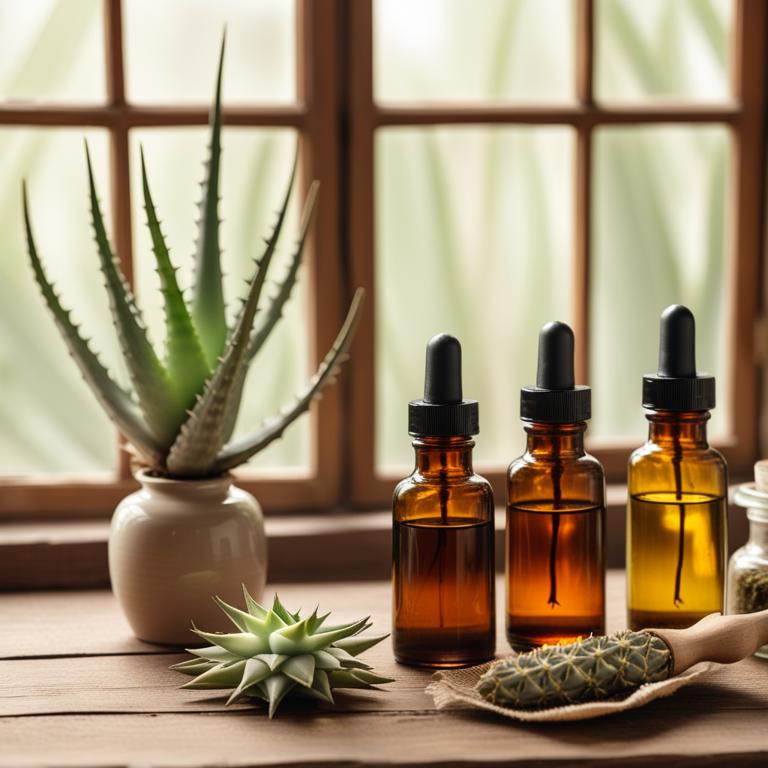
Aloe vera tinctures have been found to be effective in treating the pimples ailment due to their anti-inflammatory, antibacterial, and soothing properties.
The herbal preparation helps to treat this ailment by reducing redness and inflammation, preventing bacterial growth, and promoting wound healing.
The bioactive constituents of aloe vera tinctures, such as aloin and acemannan, contribute to their therapeutic effects by modulating the immune system and reducing oxidative stress.
The benefits of using aloe vera tinctures to treat pimples include reduced acne severity, improved skin clarity, and enhanced overall skin health.
Related Study
According to the study, Aloe vera tinctures for pimples have been found to exhibit beneficial aspects on skin, particularly with regard to healing of wounds and burn injuries, which may be associated with its antifungal, antiviral, antibacterial, and acaricidal activity against skin infections such as acne.
5. Hypericum perforatum tinctures
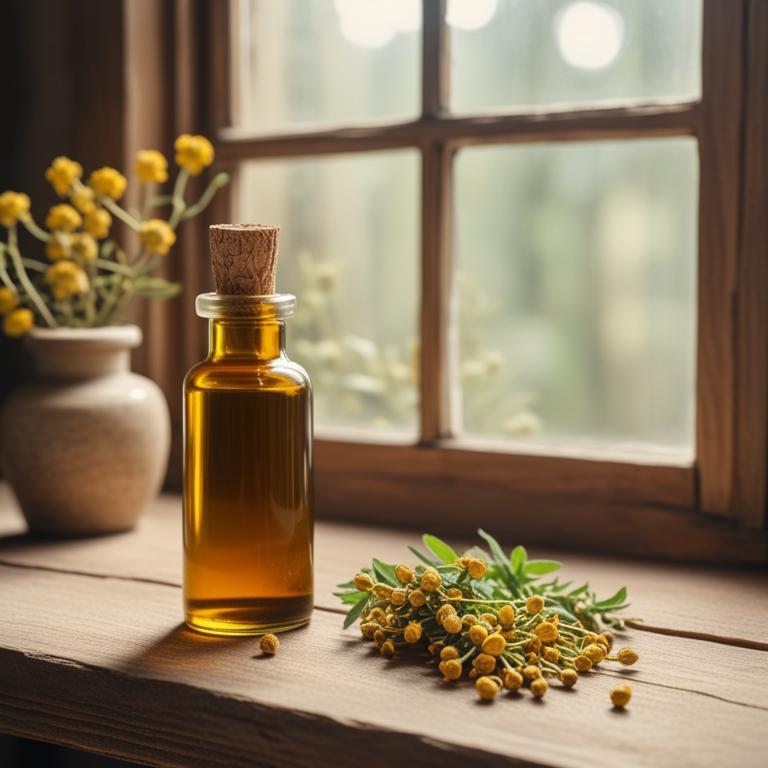
Hypericum perforatum tinctures, also known as St. John's Wort, have been traditionally used to treat various skin conditions, including pimples, due to their anti-inflammatory and antimicrobial properties.
The bioactive constituents, including hyperforin and hypericin, help to reduce inflammation and prevent the growth of bacteria that cause pimples.
By reducing inflammation and preventing bacterial growth, Hypericum perforatum tinctures can help to treat pimples by promoting healing and reducing the appearance of acne.
The benefits of using Hypericum perforatum tinctures to treat pimples include reduced inflammation, fewer breakouts, and a healthier, clearer complexion.
Related Study
According to "Dermatologic therapy", Hypericum perforatum tinctures for pimples may be beneficial due to its Oregon grape root properties, which have synergistic antibacterial, anti-inflammatory, and bile-stimulating properties.
6. Zingiber officinale tinctures

Zingiber officinale tinctures, derived from the rhizomes of the ginger plant, have been traditionally used to treat pimples due to their anti-inflammatory and antimicrobial properties.
The bioactive constituents of Zingiber officinale, such as gingerols and shogaols, help to reduce inflammation and fight bacterial infections that can cause pimples.
By reducing inflammation and combating bacterial growth, Zingiber officinale tinctures help to alleviate the symptoms of pimples, including redness, swelling, and pain.
The benefits of using Zingiber officinale tinctures to treat pimples include reduced severity and duration of breakouts, improved skin clarity, and a natural, non-invasive approach to acne treatment.
7. Calendula officinalis tinctures
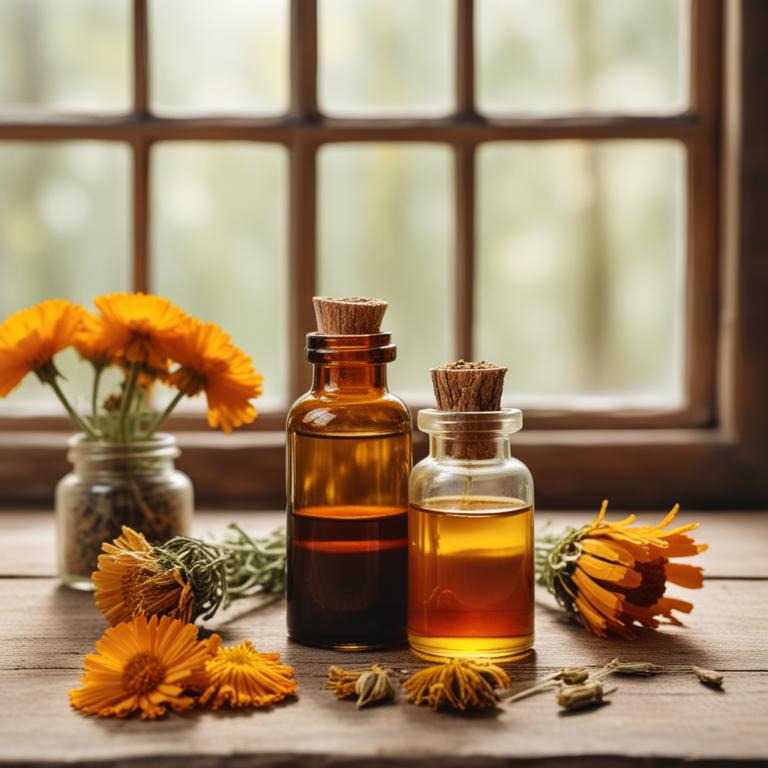
Calendula officinalis tinctures have been traditionally used to treat pimples, a common skin condition characterized by inflammation and infection.
The anti-inflammatory and antimicrobial properties of calendula help to reduce redness, swelling, and bacterial growth, promoting a faster healing process.
The bioactive constituents, including triterpenoid saponins and sesquiterpenes, have been shown to exhibit antimicrobial, anti-inflammatory, and antioxidant activities, which contribute to the treatment of pimples.
The benefits of using calendula tinctures to treat pimples include reduced inflammation, accelerated healing, and prevention of further infection, making it a natural and effective alternative to conventional treatments.
Related Study
According to "Phytomedicine : international journal of phytotherapy and phytopharmacology", Calendula officinalis tinctures, as part of a three-herbs formula with Cortex Moutan and Herba Menthae, have shown anti-inflammatory effects and promoted cell migration, which may be beneficial in treating skin conditions such as atopic dermatitis and possibly pimples.
8. Melissa officinalis tinctures
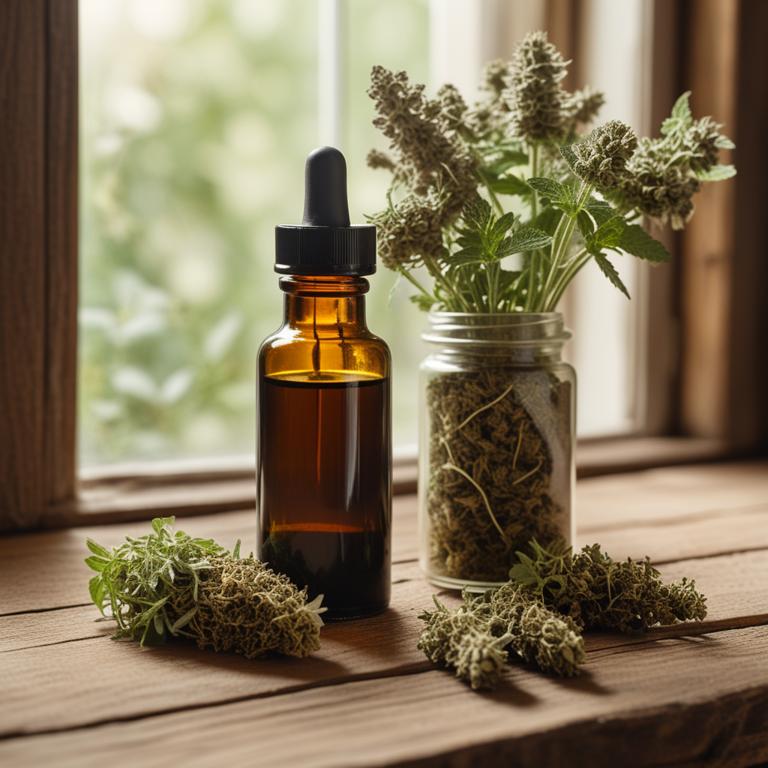
Melissa officinalis tinctures are known for their potential to treat pimples due to their anti-inflammatory and antibacterial properties, which help to reduce redness and prevent infection.
The tannins and flavonoids present in Melissa officinalis tinctures have been shown to exhibit antioxidant and anti-inflammatory activities, which can help to soothe and calm the skin, reducing the appearance of pimples.
The bioactive constituents of Melissa officinalis tinctures, including rosmarinic acid and ursolic acid, contribute to its therapeutic effects, helping to reduce inflammation and prevent the formation of acne.
Regular use of Melissa officinalis tinctures can provide numerous benefits in treating pimples, including reduced inflammation, improved skin texture, and a decrease in the frequency and severity of breakouts.
9. Rosmarinus officinalis tinctures
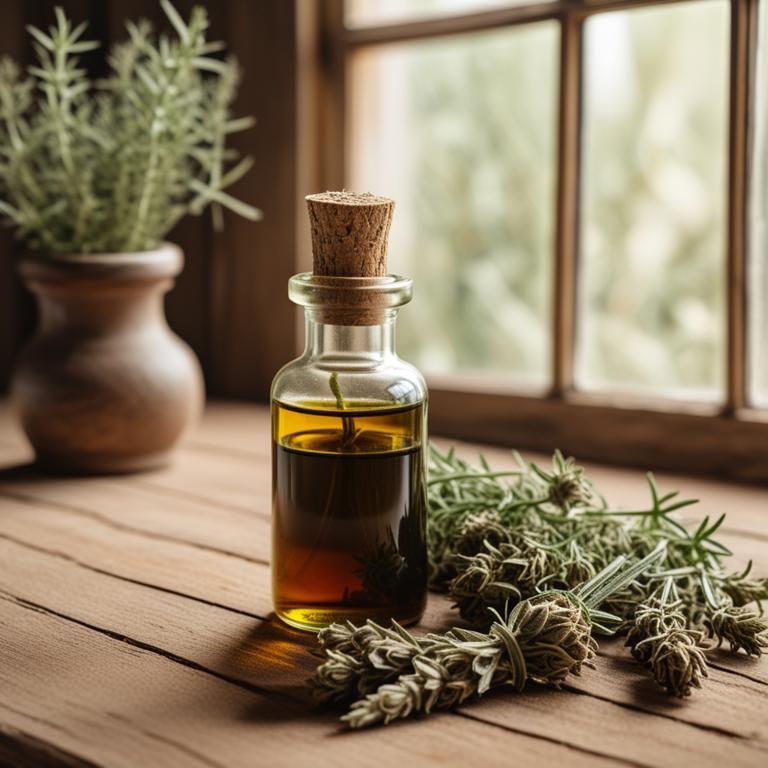
Rosmarinus officinalis tinctures have been used to treat pimples due to their anti-inflammatory and antimicrobial properties, which help to soothe and calm the skin.
The bioactive constituents, including carnosic acid, carnosol, and rosmarinic acid, exhibit strong antioxidant and antibacterial activities that aid in reducing inflammation and preventing infection, ultimately leading to the treatment of pimples.
By inhibiting the growth of bacteria and reducing inflammation, Rosmarinus officinalis tinctures help to alleviate the symptoms of pimples, promoting a faster recovery and reducing the risk of scarring.
The benefits of using Rosmarinus officinalis tinctures to treat pimples include improved skin health, reduced inflammation, and a lower risk of complications, making it a natural and effective remedy for this common skin condition.
10. Lavandula angustifolia tinctures
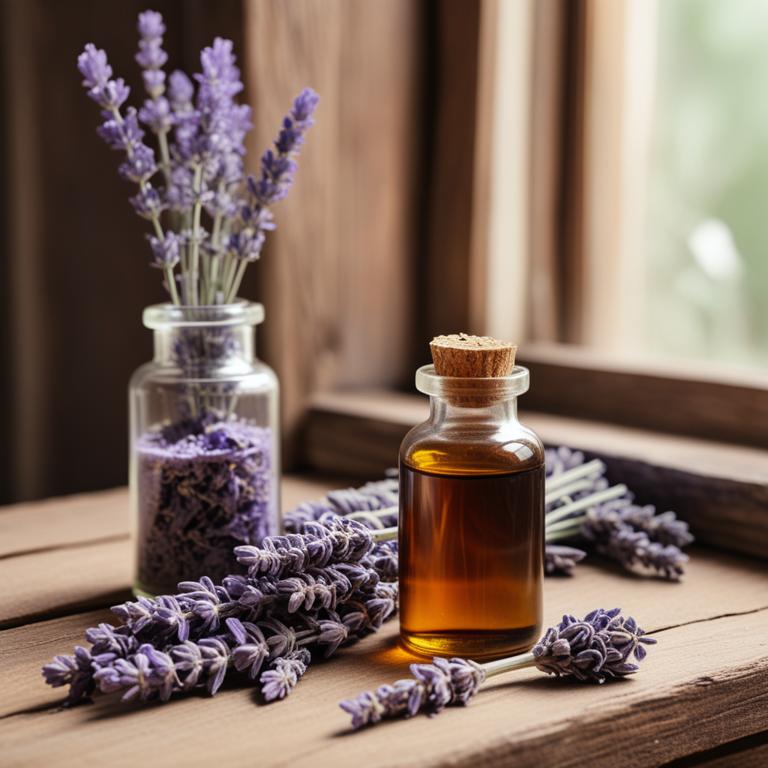
Lavandula angustifolia tinctures are a natural herbal preparation that has been traditionally used to treat pimples due to its anti-inflammatory, antibacterial, and antiseptic properties.
The bioactive constituents present in Lavandula angustifolia, such as linalool and linalyl acetate, help to reduce inflammation and prevent the growth of bacteria that can cause pimples.
By reducing inflammation and preventing bacterial growth, Lavandula angustifolia tinctures help to alleviate symptoms of pimples, such as redness and swelling, and promote the healing of affected skin.
Regular use of Lavandula angustifolia tinctures can provide benefits in treating pimples, including reduced appearance of acne, faster healing of skin lesions, and improved overall skin health.
11. Echinacea purpurea tinctures

Echinacea purpurea tinctures have been traditionally used to help alleviate and treat pimples, a common skin condition characterized by inflamed and infected pores.
This herbal preparation possesses anti-inflammatory and antimicrobial properties, which contribute to its effectiveness in treating pimples.
The bioactive constituents of Echinacea purpurea, including alkylamides, glycosides, and phenolic acids, play a crucial role in its ability to reduce inflammation and combat bacterial infections, ultimately leading to a reduction in pimple severity.
Regular use of Echinacea purpurea tinctures may help to soothe and calm the skin, promoting a healthier complexion and reducing the appearance of pimples.
12. Cinchona officinalis tinctures

Cinchona officinalis tinctures have been traditionally used to treat pimples due to their anti-inflammatory and antibacterial properties, which help to reduce redness and combat the underlying infection.
The tannins and alkaloids present in Cinchona officinalis, such as quinine and quinidine, exhibit astringent and antiseptic effects that aid in drying out the pimple and preventing further inflammation.
By reducing the severity of the infection and promoting a healing environment, Cinchona officinalis tinctures can help to alleviate symptoms and promote faster recovery from pimples.
The benefits of using Cinchona officinalis tinctures to treat pimples include reduced redness, fewer breakouts, and a faster return to normal skin health.
13. Glycyrrhiza glabra tinctures

Glycyrrhiza glabra tinctures, derived from the roots of the licorice plant, have been traditionally used to treat pimples due to their anti-inflammatory and antibacterial properties.
The bioactive constituents, including glycyrrhizin, flavonoids, and saponins, help to reduce inflammation and combat bacterial infections that cause pimples.
Glycyrrhiza glabra tinctures work by reducing the production of sebum, an oily substance that can clog pores and lead to acne, while also soothing and calming the skin.
The benefits of using Glycyrrhiza glabra tinctures to treat pimples include reduced redness, inflammation, and scarring, as well as improved skin clarity and a reduced risk of future breakouts.